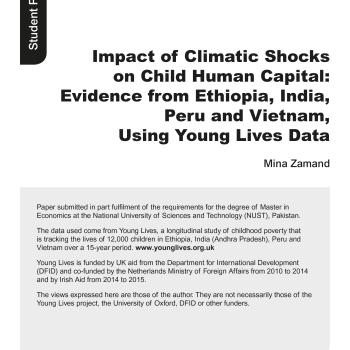
This study analyses the impact of two different climatic shocks drought and excessive rainfall/flood, as perceived by households on child human capital across four countries – Ethiopia, India, Peru and Vietnam; countries with diverse socio-economic backgrounds. Human capital, in this context, subsumes both child learning and health outcomes. The data source is the Young Lives Study and cross-sectional household data is utilized for the year 2009. The study examines the data on the older cohort of children, 14–16 years of age, and covers both urban and rural areas. The enrolment rate, Peabody Picture Vocabulary Test (PPVT), Cloze test and Mathematics test scores are used as proxies for child learning outcomes. The health outcome variables being studied are the WHO defined Body Mass Index for Age(BFA) z-scores and Height for Age (HFA) z-scores.
The overall objective is to underscore both the vulnerability of children to the vagaries of nature and the pressing need to develop policies and welfare programs to protect children against such shocks. Additionally, the study aims to analyse the role of institutional help and household characteristics in buffering these climatic shocks. We find that broad categorization of the impact of climate shocks ignores heterogeneity and coping strategies across children and households. Theory and empirics both point out to the existence of positive and negative outcomes associated with climate shocks. Our results support theory and find different positive and negative impacts on educational and health measures in the group of countries considered, with negative impacts being more common. On the policy front the importance of improving access to credit, effective targeting and reducing the disincentive effects of employment guarantee schemes is emphasized.
Keywords: Climatic shock; Human capital; Cognitive ability; Schooling; Health outcomes; Ethiopia; India; Peru; Vietnam

This study analyses the impact of two different climatic shocks drought and excessive rainfall/flood, as perceived by households on child human capital across four countries – Ethiopia, India, Peru and Vietnam; countries with diverse socio-economic backgrounds. Human capital, in this context, subsumes both child learning and health outcomes. The data source is the Young Lives Study and cross-sectional household data is utilized for the year 2009. The study examines the data on the older cohort of children, 14–16 years of age, and covers both urban and rural areas. The enrolment rate, Peabody Picture Vocabulary Test (PPVT), Cloze test and Mathematics test scores are used as proxies for child learning outcomes. The health outcome variables being studied are the WHO defined Body Mass Index for Age(BFA) z-scores and Height for Age (HFA) z-scores.
The overall objective is to underscore both the vulnerability of children to the vagaries of nature and the pressing need to develop policies and welfare programs to protect children against such shocks. Additionally, the study aims to analyse the role of institutional help and household characteristics in buffering these climatic shocks. We find that broad categorization of the impact of climate shocks ignores heterogeneity and coping strategies across children and households. Theory and empirics both point out to the existence of positive and negative outcomes associated with climate shocks. Our results support theory and find different positive and negative impacts on educational and health measures in the group of countries considered, with negative impacts being more common. On the policy front the importance of improving access to credit, effective targeting and reducing the disincentive effects of employment guarantee schemes is emphasized.
Keywords: Climatic shock; Human capital; Cognitive ability; Schooling; Health outcomes; Ethiopia; India; Peru; Vietnam

